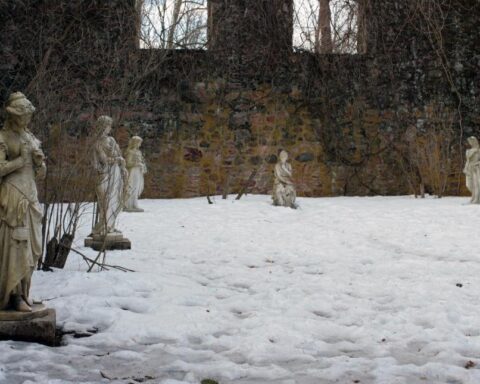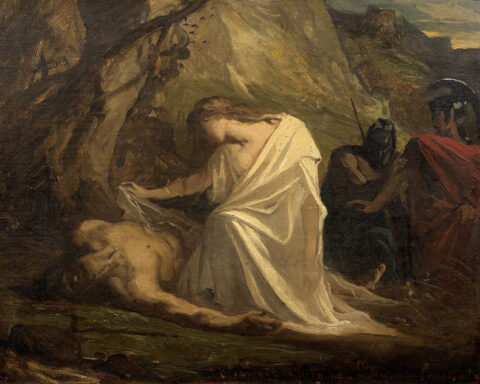“She’s my alternate wife, he tells the doctor. “You can say anything in front of her.”
Brian’s eyes smile at mine as I squeak out a little chuckle. His eyes. Green. Playful. The Brian I’ve always known.
“She’s actually seen as much of me as my wife has.” He laughs.
Doctor shoots me a sharp, suspicious look.
I wave my arm in dismissal. “We go way back!” I say, feeling strangely apologetic.
“My first wife was her sister,” Brian says, as if that’s a good reason.
“Ah, okay,” he mumbles, as he lifts up each sheet of paper on his clipboard.
Brian and I lock eyes again. The man can take a stare and run it right through.
“Well,” Doc begins. “As you know, the last drugs we gave you didn’t help, but we aren’t giving up yet.”
Yet? Did he mean to say yet?
He flips the pages back down and leans his elbows on the clipboard, bends in towards Brian.
“We’re gonna take out that PICC line because it’s getting infected.”
“Whatever you have to do,” Brian says. “I trust you guys completely.”
I usually visit Brian in the evening, when he’s alone and wants company. Staff doesn’t enforce regular visiting hours like they do on other wards.
Once outside my eyes scale the red brick walls of the building, one floor at a time and pause at the sixth, to the window of the room where Brian has spent the last two months. By some non-existent supernatural power, I will him to bound out of bed and wave down to me, but, he doesn’t get up much now.
It’s a particularly cold March, even as the planet rotates into Spring. Winds whip and swirl; there’s snow on the ground. My face stings and my fingers ache through gloves that felt sufficient earlier in the day. I have to scrape a layer of ice off the windows of my car. But warmer weather is just around the corner. I’m sure it is.
“I can’t wait to get out for a walk,” Brian says. “If there’s a good time to be sick, it’s gotta be winter.”
He’s the most positive guy I know.
He loves the outdoors. He’s hiked the Canadian Rockies, the Alps in Switzerland, heard the wild roars in Africa.
His hair is gone now. I’ve made him a couple of beanies and he says they are perfect for keeping him warm, especially through the night.
“I hear I look like Walter White?” he grins.
“Oh my god, you do!” I laugh. “A little better looking than Walter, though!”
One night Brian is particularly chatty. He describes in detail how he and my sister, Mary Anne met. They were both seventeen. I tell him I saw them the first night he brought her home from a date. A thirteen-year-old romanticist, I watched through the curtains and sighed when he kissed her. Under a lamplight no less. Brian doesn’t look at me as he talks. He’s focusing on the memory and he grins and smiles and chuckles as if Mary Anne is at the end of his bed, listening. Another night he recalls his work career, from his early days in a mail room and up through the years. His name recall is amazing and he’s beaming.
“I hope I haven’t bored you too much,” he says when we connect again, eye to eye.
“I’ve loved listening, Brian,” I tell him. And I truly have. I was part of their lives, my sister’s and his. We were all together for family times, couples’ times, weekends spent together, vacations shared between our family and theirs. But I don’t know all the details of their lives. Of course, I don’t.
I do know how much he loved my sister. They were barely twenty when they married, two kids with a baby on the way sprung from the safety of their families’ and into a world of rent and bills and diapers. To me they were the coolest couple ever and I spent hours at their small, top-of-a-house apartment. I sat cross-legged on their shag rug and we turned Guess Who records up loudly, until they woke the baby. I shared in their suppers of boxed mac and cheese, sometimes with sliced hotdogs and ketchup on top. Brian would read poetry to Mary Anne, from Coleridge to Poe, to the folksy tales of Robert Service. He and Mary Anne were my idols, my ideal, my dream of something better. They were every love story I’d subscribed to, every chord in the musicals. I wanted what they had, I wanted it badly and got married myself at the same tender age as my sister. But, he wasn’t Brian.
It was January when Brian ended up in the ER with headaches and dizziness. Within hours, a dismal diagnosis. Leukemia.
Not Brian!
I flipped madly through screen after screen online, hoping the next page would have better news. The odds of survival dropped drastically if one was sixty-five years old and beyond. Brian had just barely turned that age. The calculations promised that five percent survived. And Brian would. I was sure of it.
Cancer was a disease that fortunately, I didn’t know a lot about. But, I did know death. My Dad dropped dead at the age of fifty, collapsed from a heart attack while walking down the street. It blew apart everything that seemed good and honest and gentle in the world. And then, our Mary Anne died suddenly too. A stroke when she was just forty-six took her from us within hours. I’d foolishly thought that such death could only happen once, as if we’re born with some preordained quota of loss and pain. I knew the emptiness, that part of you scraped and hollowed-out. I knew the meaning of a shattered life, the heart that breaks into jagged pieces, the numbness that it creates.
Brian and I navigated the days following my sister’s death. We lived in the same neighbourhood and walked together every night, talking, without understanding. We began to spend more time together, author readings, dinner, wine, music, hiking and skiing. I was in the midst of a divorce and he cared for me. We’d been two couples, with three children each, who had shared so much together. Now we were all spinning out of control, trapped in that big rolling ball of misery that grows and grows. And yet, there were many times we smiled, we laughed, we remembered the good. Brian and I shared so many of the same memories. We knew each other well.
Friends whispered, but some spoke bluntly. “Be careful. You’re both so vulnerable right now.”
Brian was my sister’s husband. Hers. Not mine.
Though it seemed impossible at the time, somehow those days turned into years. I married again. Brian married again. I moved away. But, he remained my mentor, my brother, my father, my friend, the man I’d loved and the man who loved her. When we were together, time stopped. We were us again.
~
A perfect summer’s night. Brian and I sit alone under starlight at a wrought iron table set for four, our spouses up dancing to the tin-whistled tunes of an Irish band. Thyme grows between the slabs of stones under our feet. Champagne that filled my glass over and over again before dinner has taken effect. I am completely in love with absolutely everything.
Brian is as handsome as ever, a grey blazer over top a black golf shirt, highlighting the salt and pepper hair that is always so thick and neat that even a strong wind can’t rustle its strands. He gazes at me with those green eyes that never cease to mystify; I long to know what he’s thinking. There’s a slight smile on his lips; the skin around his eyes, crinkles, just a bit.
Words I’ve been longing to say for so many years, that I’ve held onto tightly, fearing they will betray my sister, finally escape.
“Did you ever think that you and I might have been a couple?”
Every word I’ve just spoken floats in the air, hangs cautiously, fearfully, the lack of a breeze keeps them dangling.
Brian’s lips lose their smile. He does not utter a word. He just stares. Into my soul. Piercing my heart. The seconds are evenly paced until the words dissipate gently, quietly, like balloons that are slowly leaking air. They collapse into the Thyme, crushed. His eyes hang onto mine and mine don’t want to let go. Can’t. But one of us has to. Our spouses are soon to return. I turn slightly and lift my wine glass.
“Cheers!” I smile.
Brian turns and looks away, into the depth of a night soaked with moonlight and stars.
Please, not Brian.
~
April comes. There are some good days for Brian, new drugs. There’s talk of a bone marrow transplant. Tests to find a donor. The snow melts. Crocuses pierce the soil, their needle-like stems pointing upwards. But, by mid-April, all hope halts. Those six cruel, cliched, words rip through the stale air of a hospital room: “There’s nothing else we can do.” The leukemia has won. It has stolen his body. It will take away his life.
His oldest daughter and I spend the night in the hospital. They bring us blankets, toothbrushes, roll-aways. There is little sleep. We talk. She was the baby I played with when her parents were so young. She was the one that first made them a family. The reason for the shot-gun wedding. She was the only grandchild my father held.
In the morning Brian wants to see more people. He wants to play a favourite card game with his daughters. He wants to compose emails. He wants to talk about the after, the celebration of life, the words, the songs. He wants to say goodbye.
I am getting ready to go home that night. He reaches his arms out to me, one of them so swollen and red and heavy with infection, the other with an intravenous tube coming out from the back of his hand. I sit perilously on the edge of his bed and lean my head against him, feeling his heart beat and the warm, waning strength of his chest. His needled hand runs through my hair, in slow motion, sliding his fingers through the strands, separating them, holding on at the ends. It feels so good, so right. I move up to kiss his cheek, the light stubble of his missing beard against my lips. His familiar voice, just a whisper, close to my ear, “I love you,” he says. “Oh, Brian, I love you too, so much.” I exhale. “I’ve always loved you.”
I glance back one more time before I leave his room. We smile at one another, my eyes not wanting to lose the memory of his.
The next morning, we’re told Brian’s organs are shutting down. Yet somehow, I still can’t believe it. It’s like we are all actors in this melodrama and that any moment Brian will bound out of bed, throw off his hospital garb, strut down the hallway and leave. Surely, someone will soon call out, “That’s a wrap!”
He isn’t speaking or moving at all now. Blankets are tucked neatly under each armpit, all monitors and tubes removed.
We take turns, walking from the family lounge to his room. And back. A band of grievers. A circle of love.
His eyes are closed. No words come out. One daughter sits by his bed and reads poetry to him. It’s Canadian. It’s raw, funny, sardonic. She winces a bit. “Should I be reading this?”
“He wanted you to, Jen,” I tell her. She continues.
He’s not moving. I sit alone with him, feather touch his swollen arm, his hand. Whisper to him.
“Brian, we’re all here with you. We all love you so much.”
I run the backs of my fingers down his face, under his chin. He’s tried so hard to be strong for everyone, just the way he always has.
I’m pleading now, watching Brian, listening to his shallow breaths. “Just let go, Brian,” I say in silence. “Please, just let go.”
A nurse appears. Presses a stethoscope against his chest, places two fingers on his wrist.
“We should get the family in here,” she says.
In the next few minutes we are all around his bed: his daughters, his mother, sisters and brother, grandchildren, his wife, and me. I stand at the end of his bed, my hands touching the blanket that covers his legs. It’s quiet. It’s calm. Within minutes the stethoscope again. The nurse nods this time. She steps away from the bed.
“I’m so sorry,” she says, tears in her eyes.
It is over. Brian is gone. I walk the few steps to the top of his bed, lean in and kiss his forehead.
“Love you, buddy,” I breathe.
I walk slowly down the hallway, back to the lounge, each square of linoleum moving under my feet, a conveyor belt carrying me back to that world of grief, of pain and longing. The rest of his family gradually pour back in, the children Mary Anne bore, the women who are mothers now themselves. One daughter has Brian’s eyes, another Mary Anne’s hair, and one, her smile.
We bury Brian’s ashes atop Mary Anne’s casket. A CD plays Israel Kamakawiwo’ole, Somewhere Over the Rainbow. His grandchildren release balloons and we watch them fade to nothingness in a clear blue sky. I crouch down in front of my sister’s headstone, trace each letter of her name.
I feel the warmth of my husband’s hand on my shoulder.
Standing, I look into his blue eyes. “I wish you’d known them, Steve,” I tell him. “You’d have loved her too.”
Steve holds my hand, lightly squeezes it. I squeeze back, then hold on tightly.



